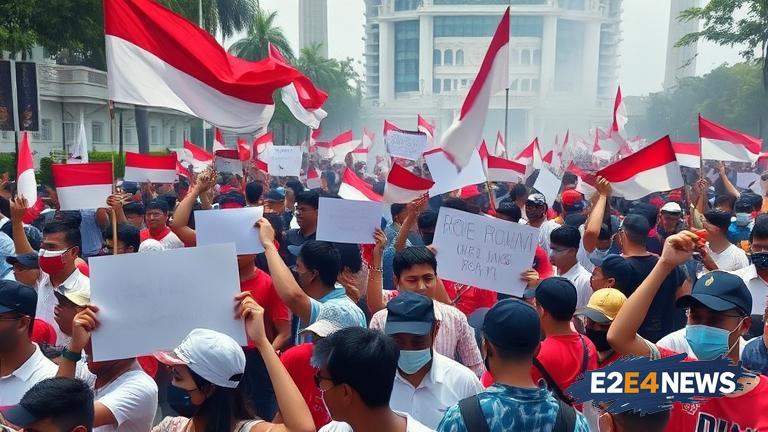Thousands of protesters took to the streets in Indonesia, voicing their discontent against the high salaries of parliament members. The demonstrations, which were largely peaceful, saw citizens from all walks of life gathering to express their frustration with the current state of affairs. The protesters argued that the parliamentary salaries are exorbitant and unjust, especially when compared to the average income of Indonesian citizens. Many held placards and banners, reading ‘Reduce Parliamentary Salaries’ and ‘End Corruption’. The protests were sparked by a recent announcement that parliamentary members would be receiving a significant salary increase, despite the country’s struggling economy. Citizens feel that the government is out of touch with the people and that the salary hike is a clear example of the corruption and nepotism that plagues the country. The protests were organized by various civil society groups and student organizations, who are demanding that the government take immediate action to address the issue. The demonstrators are calling for a reduction in parliamentary salaries and an increase in transparency and accountability within the government. They also demanded that the government focus on addressing the country’s pressing issues, such as poverty, unemployment, and inequality. The protests were not limited to the capital city, Jakarta, but were also held in other major cities across the country, including Surabaya, Bandung, and Yogyakarta. The government has responded to the protests by stating that the salary increase is necessary to attract and retain talented individuals in the parliament. However, this argument has been met with skepticism by the protesters, who point out that many parliamentary members are already wealthy and do not need the high salaries. The protests have highlighted the growing discontent among Indonesian citizens with the government and the political elite. Many feel that the government is not doing enough to address the country’s problems and that the parliamentary salaries are a symbol of the corruption and excess that pervades the system. The demonstrations have also sparked a wider debate about the role of parliament and the need for greater transparency and accountability within the government. As the protests continue, it remains to be seen how the government will respond to the demands of the demonstrators. The international community is also watching the situation closely, with many calling for the Indonesian government to take steps to address the concerns of its citizens. The protests have been largely peaceful, but there are concerns that the situation could escalate if the government does not take concrete steps to address the issues. The Indonesian government has a long history of corruption and nepotism, and the current protests are just the latest example of the growing discontent among citizens. The country has made significant progress in recent years, but the protests highlight the need for further reform and greater accountability within the government. The demonstrations have also sparked a wider conversation about the need for greater transparency and accountability within the government, and the importance of addressing the root causes of corruption and inequality. The Indonesian government must take immediate action to address the concerns of its citizens and work towards creating a more just and equitable society. The protests are a wake-up call for the government, and it is up to them to respond to the demands of the demonstrators and work towards creating a better future for all Indonesians. The situation is being closely monitored by the international community, and the Indonesian government must be held accountable for its actions. The protests are a testament to the power of citizen activism and the importance of holding those in power accountable. As the situation continues to unfold, it is clear that the Indonesian government must take concrete steps to address the concerns of its citizens and work towards creating a more just and equitable society.
